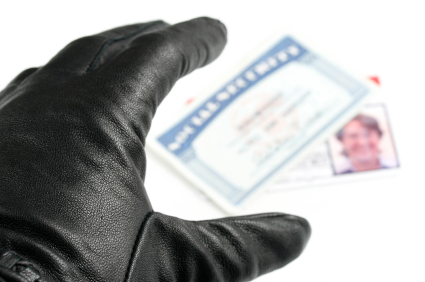Posts Tagged ‘ID Theft Solutions’
Prevent Identity Theft With an Employee Criminal Background Check
Do you know how easy it is to infiltrate, expose, and compromise any type of health care agency? Identity theft can easily happen right under your nose, so the best defense is a good offense. Know your rights and know how you can protect your business by performing an employee criminal background check for prospective employees during the hiring process. Unfortunately, as crime statistics for identity theft continue to soar, an employee criminal background check is more important than ever before for corporations and physician’s offices of any size.
Any employee can be a potential thief, so an employee criminal background check should be conducted on every new hire, whether it is a full time in home caregiver or a temporary /transitional caregiver. As the aging baby boomers discover it is better to have in-home care, and now economy continues to recover, more agencies are hiring more employees, it’s important to know the “do’s and don’ts” of an employee criminal background check. An employee criminal background check ensures that you are protected from identity theft predators or opportunistic criminals masquerading as enthusiastic job applicants. There are many things to consider when performing an employee criminal background check, including the components, laws, and processes necessary to ensure a new employee can be trusted with sensitive information.
What’s Included in an Employee Criminal Background Check?
Every employee background check also includes a thorough employee criminal background check. Some of the information is public and some is private, but all of the information is important in assessing a job applicant. Although the type of information checked varies from state to state and county to county, an employee criminal background check can include:
- Credit, driving, criminal, education, medical, drug test, court, military, and bankruptcy records
- Social Security Number
- Vehicle registration
- Property ownership
- Past employment
- Professional and personal references
All of this information is invaluable, but one aspect that is often overlooked is the credit report. A poor credit rating makes the average applicant a higher risk for identity theft. Additionally, research shows that one in four disputes over information on an employee criminal background check is connected to identity theft issues, so take every precaution to thoroughly evaluate every prospective employee’s credit and criminal records.
Are There Employee Criminal Background Check Laws?
Yes! They vary by state, but the Federal Fair Credit Reporting Act (FCRA) set national standards for performing an employee criminal background check. The law only applies to an employee criminal background check conducted by a consumer reporting agency, which is a firm that administers the employee criminal background check on your behalf. If you decide to perform an employee criminal background check in-house, make sure you follow your state’s background check laws carefully. Remember: Employees have rights, too!
According to the FCRA, some information cannot be reported in an employee criminal background check:
- Accounts in collection longer than seven years
- Paid tax liens beyond seven years
- Bankruptcies after ten years
- Arrest records, civil suits, and civil judgments after seven years
Employee Criminal Background Check: An Overview
Follow this employee criminal background check “cheat sheet” to safeguard your company from identity thieves and potential criminals in the workplace:
- Who: Every employee!
- What: A comprehensive employee criminal background check that abides by all applicable laws
- When: Before an employee is hired
- Why: To protect your business and your employees!
- How: Either in-house or by a consumer reporting agency
If you have questions or need assistance performing an employee criminal background check, don’t hesitate to the contact the experts! It can save your business from disaster. Contact Linda Vincent at 310-831-4400 or connect with her at linda@theidentityadvocate.com
Tax Refund Identity Theft: What You Need to Know
 As another year comes to an end and we prepare our tax returns, the IRS and other government officials are preparing for an increase in tax refund identity theft. In 2011, the IRS missed over 1.1 million fraudulent tax returns and paid out over $3.6 billion in fraudulent tax refunds.
As another year comes to an end and we prepare our tax returns, the IRS and other government officials are preparing for an increase in tax refund identity theft. In 2011, the IRS missed over 1.1 million fraudulent tax returns and paid out over $3.6 billion in fraudulent tax refunds.
Fortunately, this year they’re taking more precautions to protect taxpayer identities. Even with these precautions, it’s important for you to know how to protect yourself from becoming another victim of tax refund identity theft.
How to Know if Your Tax Return or Records Have Been Affected
Identity thieves file fraudulent tax returns using legitimate taxpayers’ information. They file a fake tax return on your behalf, collect the refund, and repeat the process with another taxpayer. They often do this early in the tax season—before you are likely to file yours—so you’re often unaware a fraudulent tax return was even submitted in your name until much later.
Taxpayers only discover they’re victims of tax refund identity theft when they attempt to file a legitimate return. The IRS will reject the tax return and typically sends a notification stating that:
- More than one tax return has already been filed
- There is a balance due or collection actions have been taken for unfiled tax returns
- The IRS has realized you’ve received wages from employers that you don’t know
If you receive any notification from the IRS, you must respond immediately. You will be required to fill out IRS Form 14039 if you believe you’re the victim of tax refund identity theft.
Tips for Protecting Yourself From Tax Fraud
There are many things you can do to prevent identity theft when you submit this year’s tax return. While you should always protect your personal information, you should also:
- Sign-up with ID Theft Solutions, the only identity theft protection company managed by law enforcement that restores your identity back to pre-theft status.
- Never carry your Social Security card with you or any documents that have your Social Security number on it. If your purse/wallet is lost or stolen, a thief can easily gain access to your identity.
- Never give out your Social Security number just because someone requests it—especially a supposed phone call from a government official. The IRS will never initiate contact with you via the phone, so you are probably speaking with someone who is trying to commit tax refund identity theft. If you have any questions about the status of your tax return, hang up and call the IRS directly.
- Lock up or shred documents containing personal information or financial data.
- Review your credit report from each of the three major credit bureaus at least once a year for any fraudulent activity.
- Use firewalls, anti-virus software, and regularly update your computer’s security patches to avoid giving identity thieves access to your information via the Internet.
- Never give out personal information over email, the phone, or through snail-mail without verifying the sender.
Lastly, always keep your eye on the news for any new consumer reports regarding tax fraud or tax refund identity theft scams that could affect you. The IRS and news outlets often publish examples of fake emails and phone calls scammers use to impersonate IRS officials.
For more information about protecting yourself this tax season or advice to help you avoid tax refund identity theft, visit The Identity Advocate or call 310.831.4400. We can help safeguard your identity throughout the year from all forms of theft (and there are many!). You can also join our mailing list to have identity theft prevention tips delivered to your inbox each month.
4 Tips to Prevent Elderly Identity Theft
More than 12 million people had their identities stolen last year—a shocking statistic that continues to rise. While anyone can become a victim of identity theft, this crime especially impacts seniors who often have more wealth and have spent a lifetime developing good credit.
Elderly identity theft is common among seniors for many reasons. They are generally more trusting than younger adults, not as aware of identity theft risks and scams, and are also more likely to know the identity thief. They are prime identity theft targets online, over the phone, and even in their own homes since they’re less likely to suspect loved ones of the crime.
 Whether you’re a senior or a family member looking for ways to prevent elderly identity theft, there are many things you can do to stay protected. Let’s take a closer look at four tips to prevent identity thieves from claiming another senior victim.
Whether you’re a senior or a family member looking for ways to prevent elderly identity theft, there are many things you can do to stay protected. Let’s take a closer look at four tips to prevent identity thieves from claiming another senior victim.
1. Be Safe Online
Seniors who are typically less familiar with Internet security should avoid risky behavior online. This includes online banking and providing personal information in response to email spam. Encourage them to conduct all of their banking in person and ignore emails from people they don’t know. It is also a good idea to install security software on their computer to help prevent hackers from accessing their private information.
2. Freeze Credit
You should also implement a credit freeze. Freezing credit is easy to do and it’s an effective way to avoid elderly identity theft. To freeze a loved one’s credit you will need to contact the three credit agencies (TransUnion, Equifax, and Experian) and request a freeze. You will be required to provide the full name, address, Social Security number, a copy of a government-issued ID, and a copy of a bank statement, insurance statement, or utility bill. The freeze won’t allow any new credit accounts—including loans, bank accounts, and rental agreements—to open unless you give the credit bureau the permission and the password to unfreeze the account.
3. Stop Junk Mail
It’s easy to ignore junk mail, but many of us forget how much personal information it can contain. You can help your elderly loved one opt-out of receiving junk mail by following the instructions on www.OptOutPreScreen.com or by calling 1-888-567-8688. This eliminates or at least significantly reduces junk mail such as pre-approved credit card offers that provide opportunities for identity thieves. To prevent elderly identity theft you also want to make sure you shred all promotional mail that includes personally identifying information. Remember that simply tossing this type of mail in the trash makes it easier for dumpster divers to steal your loved one’s identity.
4. Keep Private Information Private
 Credit cards, Medicare cards, and Social Security numbers are among the most sought after sources of information identity thieves use to commit elderly identity theft. Seniors should keep information such as Medicare statements in a safe or safe deposit box, and shred them after confirmed treatments. They should never carry their Social Security card with them and carry their Medicare card only to doctor visits.
Credit cards, Medicare cards, and Social Security numbers are among the most sought after sources of information identity thieves use to commit elderly identity theft. Seniors should keep information such as Medicare statements in a safe or safe deposit box, and shred them after confirmed treatments. They should never carry their Social Security card with them and carry their Medicare card only to doctor visits.
Identity thieves regularly take advantage of the fear many seniors have about their Social Security benefits and Medicare coverage. A trusting senior may assume that the person at the door, on the other end of the phone line, or in an email are simply doing their job when they ask for their Medicare information. However, a common elderly identity theft scam is for a thief to call a senior and claim to be from the Medicare office. The thief asks for verification of the senior’s Medicare account number so that benefits can be paid, and then disappears with all of the information he needs to create a new identity. Make sure your loved one is aware that the Medicare office will never ask for this type of verification via phone, email, or in person.
Start Preventing Elderly Identity Theft
In addition to following these tips, you should also stay in regular contact with your elderly loved one to keep track of any suspicious behavior. There are also several ways to proactively stop identity theft. Sign-up with a prevention and recovery service such as ID Theft Solutions so the solutions for protecting your identity are all in one place. When your identity is compromised, you will have a personalized, one-to-one partner to take on the time-consuming recovery process on your behalf.
As always, you can rely on The Identity Advocate to keep bringing you tips to safeguard the identity of all of your family members. Learn more about preventing elderly identity theft, medical identity theft, social media identity theft, and all other forms of identity fraud by visiting www.TheIdentityAdvocate.com or by calling 310.831.4400.
How to Prevent Medical Identity Theft As Healthcare Reform Rolls-Out
 The launch of healthcare reform begins in October 2013 and has many people worried. Unfortunately, this concern isn’t just about the Affordable Care Act itself. Identity theft experts warn that the already high instances of medical identity theft are set to explode, especially as millions of Americans start looking for insurance options.
The launch of healthcare reform begins in October 2013 and has many people worried. Unfortunately, this concern isn’t just about the Affordable Care Act itself. Identity theft experts warn that the already high instances of medical identity theft are set to explode, especially as millions of Americans start looking for insurance options.
They have reasons to worry. Medical identity theft affected 1.85 million Americans this year at a cost of $41.3 billion, according to the Ponemon Institute. As the opportunities for medical identity thieves increase, many more Americans can expect to become targets. The Federal Trade Commission received over 83,000 fraud complaints in 2012 regarding “imposter scams,” in which identity thieves pose as representatives of government agencies to collect personal information. Officials expect these numbers to grow exponentially once the Affordable Care Act begins to roll-out.
The Threat of Healthcare Fraud and Medical Identity Theft
There is a lot of confusion regarding the Affordable Care Act. Signed into law in 2010, enrollment through the healthcare “exchange” begins on October 1, 2013 for coverage starting January 1, 2014. Consumer confusion about the implementation of the law has allowed identity thieves to get a jumpstart on stealing medical identities using information such as Social Security numbers, addresses, Medicare account information, medical history, and other private information.
Gaining access to this information enables identity thieves to fraudulently receive medical care, purchase prescription medications, order medical supplies, and submit false insurance claims—among other forms of healthcare fraud. Although anyone can be a target of medical identity theft, people with the highest risk of fraud include senior citizens, individuals who don’t speak English, and those who have never had insurance coverage or have experienced a lapse in coverage.
 One of the latest healthcare reform scams and medical identity theft occurs when a scammer contacts someone and tells him he’s been selected for early enrollment. The scammer poses as a federal employee and tells him that he must supply his personal and financial information, including bank account data, to receive his insurance card. What most consumers are unaware of is that there are no insurance plans or cards directly associated with the Affordable Care Act. Insurance companies, not the federal government, provide these cards, so beware of anyone who asks for this information.
One of the latest healthcare reform scams and medical identity theft occurs when a scammer contacts someone and tells him he’s been selected for early enrollment. The scammer poses as a federal employee and tells him that he must supply his personal and financial information, including bank account data, to receive his insurance card. What most consumers are unaware of is that there are no insurance plans or cards directly associated with the Affordable Care Act. Insurance companies, not the federal government, provide these cards, so beware of anyone who asks for this information.
Preventing Medical Identity Theft
Although some medical identity theft is inevitable with the Affordable Care Act, there are ways you can protect yourself and limit the chances of becoming an identity theft victim:
- Be proactive to prevent medical identity theft by signing up for an identity theft protection service such as ID Theft Solutions.
- Never provide or verify personal information over the phone, even if the caller claims to be a federal employee. Federal agencies already have this information on file, so you will never be called to supply it.
- Don’t automatically believe a caller ID screen indicating that a state or federal government agency is calling. Scammers have the latest technology and can display a government agency’s name on your caller ID.
- The government does not send unsolicited emails to request personal information. It only sends correspondence through U.S. mail. You can check the authenticity of a letter by looking up the agency’s phone number yourself and calling it for verification.
- Government employees do not make house calls, nor will they show up at your door requesting information or selling Affordable Care Act-related healthcare plans. Again, legitimate federal employees would already have your information on file.
The best way to prevent medical identity theft as healthcare reform goes into effect is to be aware of the warning signs, stay vigilant, ask plenty of questions, and never hand over your personal information. You can also take advantage of the tools, resources, and advice to avoid medical identity theft by visiting the experts at The Identity Advocate at www.TheIdentityAdvocate.com or by calling 310.831.4400.
Secure Document Shredding Helps Prevent Identity Theft
Identity theft is at an all-time high for consumers, but this insidious crime is not just a consumer problem. Companies of all types and sizes are vulnerable as well. After all, when you run a business, you’re no longer just looking out for yourself. You’re responsible for protecting the confidential data of your company, your employees, and your customers as well.
As a business you store all kinds of personal information. From Social Security numbers to credit card data to birthdates, the information you collect, store, and discard can wind up in the hands of identity thieves if you don’t take the proper precautions to shred it.
 Secure document shredding is one of the most overlooked aspects of running a business. Simply tossing a sensitive document in the trash or recycling bin puts a customer at risk for identity theft—and your business at risk for costly fines and lawsuits. The public damage to your reputation from exposing customer information can be devastating as well, all of which can result in your business having to close its doors.
Secure document shredding is one of the most overlooked aspects of running a business. Simply tossing a sensitive document in the trash or recycling bin puts a customer at risk for identity theft—and your business at risk for costly fines and lawsuits. The public damage to your reputation from exposing customer information can be devastating as well, all of which can result in your business having to close its doors.
The Importance of Secure Document Shredding For Your Business
Although electronic identity theft is on the rise, stealing paper documents is the easiest way for an identity thief to steal the information needed to open new credit card accounts, get loans, write bad checks, and generally live the high life using your good name and credit.
Businesses who have consumer information on paper documents need to utilize a secure document shredding system that protects private data after it is no longer needed. Here are a few tips to help prevent identity theft in your business:
- Implement a document destruction policy within the company. Know which documents you need to save versus which you can throw away, and the specific steps you need to take to safely destroy information.
- Don’t recycle anything unless you shred it first. Leaving confidential documents in an open recycling bin is a sure-fire way to put your business at risk.
- Be proactive. It’s always the best way to safeguard your business from identity theft. Develop a culture of identity theft prevention and security as opposed to just being reactive when something goes wrong.
- Use a professional document shredding service. This is the best way to ensure there are no gaps in your plan to prevent document shredding fraud and identity theft.
Hiring a Document Destruction Company
Even smart businesses that hire a secure document shredding company often disregard investigating the team behind the service. These companies can hire non-bonded employees—even those with criminal backgrounds—who can gain instant access to thousands of documents containing personal information.
To protect and secure the identity of your business, employees, and customers, your organization should consider hiring a secure document shredding service that:
- Conducts background checks and inspections on each employee
- Employs a rigorous training procedure that ensures employees understand the reasons behind protecting your customer information
- Is certified as a document shredding specialist
- Has a secure document shredding chain-of-custody procedure
- Issues a Certificate of Destruction that confirms the secure shredding of your sensitive documents
 In addition to hiring a reputable document shredding service, it’s important to take precautions with your own staff. Teach your employees to shred all documents before recycling them. They should also be regularly trained on privacy policies and secure document shredding procedures to reduce the risks of identity theft.
In addition to hiring a reputable document shredding service, it’s important to take precautions with your own staff. Teach your employees to shred all documents before recycling them. They should also be regularly trained on privacy policies and secure document shredding procedures to reduce the risks of identity theft.
Protecting Your Identity at Home
Don’t forget that you also have your own personal information to protect at home. Buy and use a cross-cut shredder to shred anything that has private data, such as your name, phone number, address, bank account information, Social Security number, credit card offers, and any other documents that contain personal information.
In addition to always shredding personal data, one of the best ways for you and your business to prevent identity theft is to hire a service such as ID Theft Solutions—the only identity theft protection company that also recovers your identity. ID Theft Solutions is managed by law enforcement and focuses on returning your identity back to pre-theft status.
Get assistance developing a secure document shredding policy to help prevent identity theft in your business by visiting www.TheIdentityAdvocate.com or calling 310.831.4400.
Mobile Identity Theft Threats and Prevention Tips
Mobile identity theft is one of the fastest growing types of identity theft due to the prevalence of mobile devices such as smartphones and tablets. With over one billion smartphones being used globally and research predicting this number will double by 2015, the soaring sales of mobile devices come at a time when identity theft is at an all-time high.
There was one victim of identity theft every three seconds in the U.S. in 2012, totaling 12.6 million consumers—an increase of over one million victims compared to the previous year and accounting for more than $21 billion, according to Javelin Strategy & Research’s 2013 Identity Fraud Report. These numbers are expected to rise, especially as our use of mobile devices continues to increase.
 Preventing Mobile Identity Theft
Preventing Mobile Identity Theft
Whether it’s for email, instant messaging, surfing the web, shopping online, paying bills, or even banking, we store and share an immense amount of personal data on our mobile devices. Unless steps are taken to protect it, this data is vulnerable to identity thieves who want to use it to create fake identities and steal money.
Other than being convenient to use everywhere we go, it’s important to remember that smartphones are no different than desktops or laptop computers when it comes to hackers, viruses, malware, and spyware. Their apps and mobile browsers enable us to store personal information such as passwords, credit card numbers, and bank account data in addition to our contacts and other sensitive information. When this data is breached, however, the resulting identity theft can have severe and long-lasting consequences.
Fortunately, there are many actions you can take to secure your hand-held devices and avoid mobile identity theft. Here are a few tips:
- Create a strong password that is required to unlock your phone and access data. Make sure to set up the phone to automatically lock when it has not been used for a specified period of time.
- Never share sensitive data such as passwords or credit card numbers over an unsecured Wi-Fi connection. Even something as simple as purchasing movie tickets on an iPhone using a public Wi-Fi network can give a nearby hacker the opportunity to steal your data and use it to create a fake identity.
- Carefully review your phone bills for sudden increases in data usage. You also want to be on the lookout for charges from third-party content providers for services and apps you haven’t authorized. These can be signs that your phone has been hacked and puts you at risk for mobile identity theft.
- Keep your operating system and apps up-to-date. These updates are important for keeping your smartphone or tablet current with all of the latest security enhancements.
- Make sure you are shopping on secure websites by verifying that the “s” is in the “https://” in the address bar. Websites using “http://” at the beginning of the website address are unsecure.
Professional Offices and Mobile Identity Theft
When trusted professionals or businesses use mobile devices to share information with clients, the same types of mobile identity theft are possible. Take, for example, healthcare professionals. Over 80 percent of physicians polled in an ABA Health survey revealed that they have used personal mobile devices to access the protected health information of their patients. This puts their patients at risk for mobile medical identity theft even when patients haven’t done anything to put their own identity in jeopardy.
Healthcare professionals can help secure medical records on mobile devices by creating passwords to authenticate access to patient information, and never sharing data over an unsecured Wi-Fi connection.
Mobile Identity Theft Protection Services
In spite of all the safeguards you put in place, hackers will always try to stay one step ahead of you and the available technology. Unfortunately, it’s not a matter of “if” but “when” your identity will be compromised. When it happens to you, don’t be caught without a mobile identity theft prevention plan.
There are a number of free mobile identity theft services, such as AVG, that offer anti-virus plans for mobile devices. Phones can be locked and located remotely, suspicious calls or text messages can be blocked, and widgets can detect questionable website activity.
The best identity theft protection service on the market is ID Theft Solutions. Managed by law enforcement professionals, ID Theft Solutions is the most comprehensive way to ensure your identity is recovered when it is stolen.
You can always count on The Identity Advocate to stay current on all of the latest mobile identity theft threats and solutions to help keep you and your mobile devices safe. Learn more about preventing mobile identity theft by visiting www.TheIdentityAdvocate.com or calling 310.831.4400.
This article was originally published on PInow.com.




